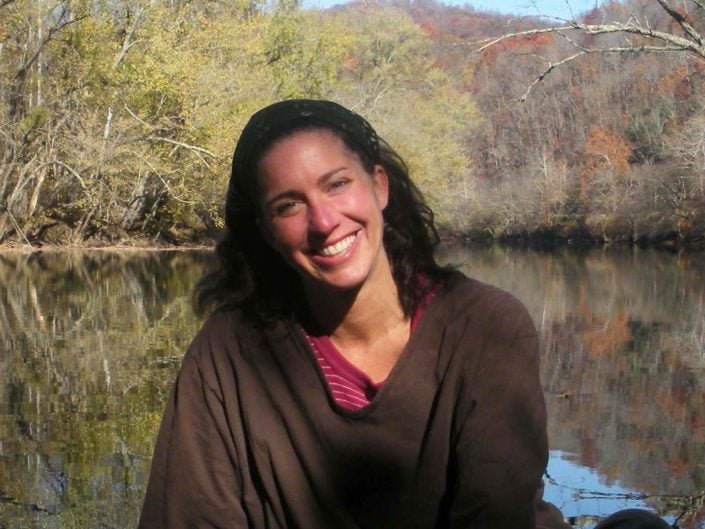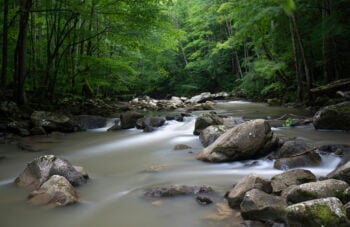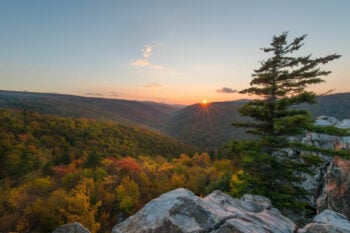Who Is Waterkeeper: Angie Rosser, West Virginia Headwaters Waterkeeper
By: Thomas Hynes

Angie Rosser is the West Virginia Headwaters Waterkeeper and also the Executive Director of the West Virginia Rivers Coalition. She grew up in Ohio and attended college in North Carolina. After that, she got to West Virginia as soon as she could. She was drawn to the state’s dichotomy wherein it both powered the nation’s industrial rise through extraction and mining, while also containing within its borders some of the most pristine and beautiful waters anywhere in the world.
Growing up, Angie always held a deep connection to nature and water. When she encountered water, in particular, she was compelled to touch it, get in it, and explore. She described the feeling as personal and elemental. She wanted to know that she could swim and being in the water, knowing it was safe and that she wouldn’t be in danger.
While working as a lobbyist in Charleston, WV around 2007, Angie began to meet people who were impacted by the state’s then recent foray into fracking. They often recounted feeling violated. Their communities were being turned into industrial sites overnight. Wells were being spoiled. Water quality, and, by extension, people’s health were being threatened. People in her newly adopted home were paying the price for greed and neglect. It echoed the story of West Virginia’s legacy of coal mining extraction and reckless mining from a century earlier.
None of this sat well with Angie, who had moved to West Virginia for its natural beauty, its amazing mountains and abundance of freshwater. It was heartbreaking to see that beauty threatened. Though, she also felt motivated by the grim thought that all this splendor might not be there for future generations to enjoy in the way that she does.

When Angie joined West Virginia Rivers Coalition in 2012, she quickly realized that she was seen as the statewide advocate in West Virginia working to strengthen environmental protections and hold polluters accountable. She also discovered that the West Virginia Headwaters Waterkeeper license was looking for a new home.. Shortly thereafter, in 2014, the license was approved.
“Being able to plug into an international network of people working on these issues was so helpful. It seemed like there was power in the united force and network that Waterkeeper Alliance had established and continues to grow. It just made a lot of sense for us,” says Angie. “Our work here often feels like it’s in isolation because there aren’t that many people here doing this work and it’s a hard place to do it. But it’s been wonderful to meet Waterkeeper groups from around the world facing similar challenges and finding ways to move the needle in the right direction.”
As it turns out, her timing was impeccable. West Virginia suffered a water crisis in 2014, where 10,000 gallons of an industrial chemical spilled into the Elk River just upstream from a drinking water intake in Charleston. The incident contaminated the drinking water for over 300,000 residents across nine counties for weeks. In West Virginia, that adds up to about 1 in 5 people.
“It was a transformative moment for me personally and the organization and the programming to really make the connection between protecting watershed health to protecting public health,” says Angie. “Water is not just recreation. It’s intrinsically linked to our wellbeing.”
However, West Virginia faces a lot of environmental degradation, and, sadly, has for a long time. It’s a place almost synonymous with coal mining. Tied up in that legacy is the fact that those coal mining jobs are relatively well paying. As it stands, there are not enough economic alternatives to replace, or, at the very least, begin to transition away from that industry overnight.
It makes it difficult to untangle West Virginia’s struggle with high poverty rates from West Virginia’s struggle with water quality issues. The two are enmeshed together and Angie is constantly compelled to have broader conversations about economic transitions and community development. It also makes projects like the Mountain Valley Pipeline seem attractive to some, despite the obvious risks.

“The challenges we face politically at this moment in history with the climate crisis is having to accelerate the transition. West Virginia is the ground zero for that debate,” says Angie. “I have a lot of empathy for workers and communities who are feeling uncertain, frightened, scared, and angry about the future. It’s not just about clean water. It’s about the future we want to create.”
As she looks ahead to what tomorrow might bring for West Virginia, Angie can’t help referring to the state’s past. For example, she is working with partners on an Ohio River Basin Restoration and Protection Plan. The goal would be to get federal funding for cleanups, similar to what happened in the Chesapeake Bay and Great Lakes, and ultimately get the attention on this watershed that is long overdue.
“We deserve it. West Virginia has powered this country over the last century with dangerous jobs. We paid this price for the rest of the country to take advantage,” says Angie. “It’s our turn. We deserve an outsized investment in making this place whole and back on track.”
Despite the many challenges – the mines, the emerging contaminants like PFAS, the many compromised politicians who refuse to even acknowledge the problems facing West Virginia – , Angie keeps up the fight.
“It would be so much worse if we weren’t here. We are creating that essential counterbalance, even though there are few of us and we are not well funded,” says Angie. “We are holding the line in really important ways. Because we all need water. It’s not dispensable. We can’t replace it.”